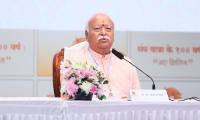The Centre has told the Supreme Court that it is yet to take a final decision on 27 per cent reservation for other backward castes in educational institutions under it and the contours of the policy was still being examined within the government.
"There is, as yet no final decision with regard to policy of reservation in matters of admission in institutions under the central government and if any such decision can be implemented, in terms of the requirement of Article 15 (5), only by an appropriate law enacted by Parliament," the Centre said in an affidavit filed in the court in response to a public interest litigation challenging its move to give 27 per cent reservation to OBCs.
The policy on OBC reservation was only a proposal and "...even if a draft legislative Bill is finalised, the same would be subject to debate and passage in Parliament", it said. Terming the petition by one Ashok Kumar Thakur as "premature and improper", the Centre requested the court to dismiss it for having asked the court "to intervene in the executive's prerogative to examine and formulate public policy options as also in the privilege of Parliament as the legislature to make appropriate laws for the purpose."
On the creamy layer issue in reservation, the Government said it was currently being debated and "a decision is yet to be taken on whether the concept of 'creamy layer' is applicable in the context of access to higher education as it is in matters of employment." It denied that Mandal Commission inflated the OBC population figure to recommend higher reservation for them. It also objected to the petitioner bringing up the issue of reservation for employment in the private sector saying "there is no policy decision as yet in regard to reservation" in private sector jobs. Such a policy has never even been formally proposed by the government, it added.
On National Sample Survey Organisation data on caste and class compositions of the population, the Centre said the petitioner has miscalculated the figures drawn by NSSO from its sample survey and misjudged the impact of the survey data quoted by him. "The NSSO data was not for the purposes of head count of different caste or class populations and they cannot therefore be relied upon to challenge any policy of reservation under consideration by the Central Government," the affidavit said.
However, the Centre said that by studying the need for and the implications of the reservation policy it was merely discharging its duty to ensure action providing for legitimate and long-delayed rights of the SEBCs/ OBCs, of whom an integral part are the SEBCs/ OBCs belonging to religious minorities.
"Such measures are designed to eliminate existing and continuing discrimination, to remedy the continuing effects of past discrimination and to create systems and procedures to prevent future discrimination," it said.
The affidavit said "any reservation policy formulated by the Central Government will ensure that only members of castes/communities identified as socially and educationally backward classes derive benefit from such a policy regardless of religious faith."
It said "the terms 'caste' and 'class' are employed interchangeably in keeping with the well-settled principle that caste itself is a valid classification for reservation." The Centre denied that existing universities cannot take the burden of the increased intake in one go or that quality of education would suffer. The Oversight Committee set up by the Government would suggest ways and means to implement reservation in higher educational institutions under Article 15(5) of the Constiution.








